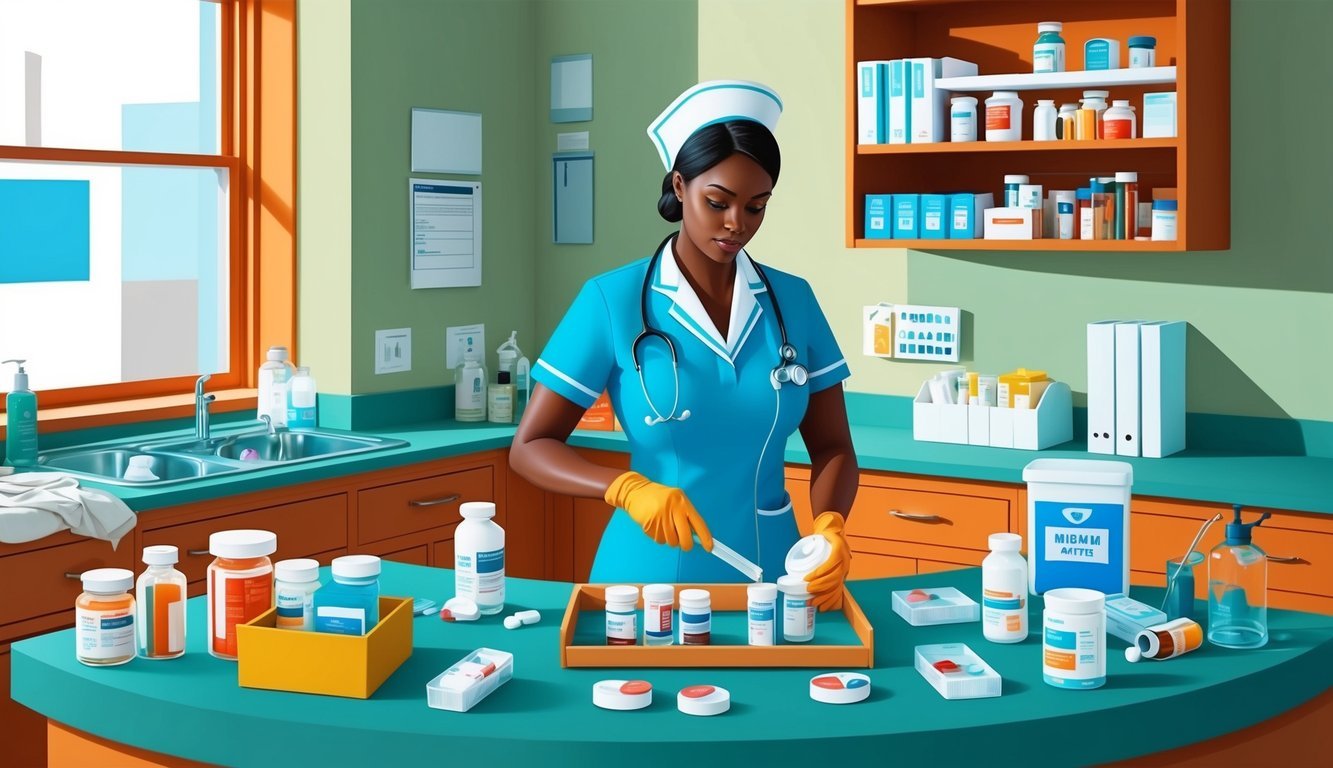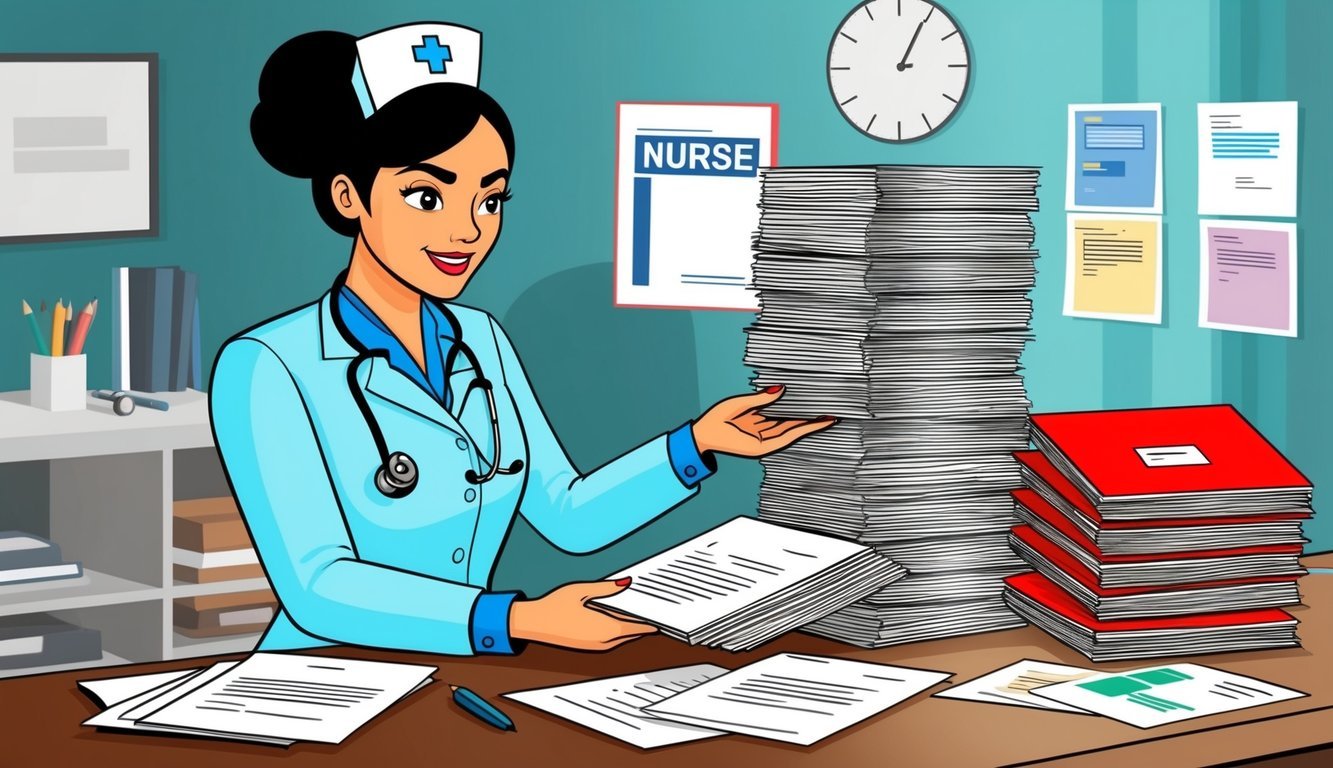Crafting an effective nursing cover letter is essential for making a strong first impression on potential employers. A well-written nursing cover letter not only highlights your qualifications but also showcases your passion for patient care and your commitment to the nursing profession.
As you prepare to apply for nursing positions, understanding the structure and content of an impactful cover letter can set you apart from other candidates.
In this blog post, you will find various examples that illustrate how to write a compelling cover letter specific to nursing.
You’ll learn what key elements to include, such as emphasizing your relevant skills and experiences while maintaining a professional tone.
To enhance your writing process, exploring templates and proven strategies can make all the difference in how your application is received.
Whether you’re a new graduate or an experienced nurse looking for a new opportunity, knowing how to effectively communicate your strengths in a nursing cover letter is vital.
You can find additional insights and resources to further refine your cover letter by visiting Resume Genius and Nurse.org.
Understanding the Basics

A well-crafted nursing cover letter is essential for making a strong first impression.
It showcases your qualifications and attention to detail, which are critical in the nursing profession.
This section will discuss the purpose of a nursing cover letter and the structure that can set you apart from other candidates.
Purpose of a Nursing Cover Letter
The primary purpose of a nursing cover letter is to introduce yourself to potential employers.
It provides a platform to highlight your relevant skills and experiences that align with the job requirements.
Your letter should capture the hiring manager’s interest by demonstrating your passion for nursing and your suitability for the position.
Make sure to include keywords from the job description to show you are a good fit.
Additionally, a well-written cover letter can complement your resume by providing context for your accomplishments.
You want to convey not just your qualifications but also your enthusiasm for the role.
The Structure of an Effective Cover Letter
An effective nursing cover letter generally follows a specific structure.
Here’s a basic template to help you organize your thoughts:
| Component | Details |
|---|---|
| Header | Your contact information at the top |
| Greeting | Address the hiring manager by name, if possible |
| Introduction | Brief overview of who you are and the position |
| Body | Discuss your qualifications and fit for the role |
| Closing | Strong conclusion expressing gratitude and eagerness |
Your introduction should grab attention, while the body should elaborate on your skills and experiences relevant to the nursing position.
Focus on clarity and conciseness.
End with a strong closing that invites further communication.
Using a structured format can greatly improve readability.
Consider checking out cover letter examples for nurses to see these elements in action.
Effective cover letters reflect your professionalism and attention to detail, which can leave a positive impression on hiring managers.
Crafting Your Opening Paragraph
The opening paragraph of your nursing cover letter sets the tone for the entire document.
It is crucial to capture the hiring manager’s attention and present yourself as a strong candidate right from the start.
Addressing the Hiring Manager
Begin your cover letter by addressing the hiring manager directly.
Use their name if available, as this personal touch can create a connection.
Research the correct spelling of their name, and avoid generic salutations like “To Whom It May Concern.”
For example, you can write:
- Dear Ms. Smith,
- Dear Mr. Johnson,
If the name is unavailable, try “Dear Hiring Manager.” Ensure your salutation is professional and respectful, setting a positive tone for the rest of your letter.
Additionally, include your contact information at the top of the letter.
This information should contain:
- Your name
- Phone number
- Email address
This ensures easy communication and demonstrates organization.
Introducing Yourself
Once you’ve addressed the hiring manager, proceed with a compelling introduction about yourself.
State your current position and experience relevant to the nursing role.
Highlight specific skills or credentials that align with the job requirements.
For instance, you might say:
“I am a registered nurse with over five years of experience in emergency care.”
Be concise while showcasing what makes you a strong candidate.
Including any relevant certifications can further demonstrate your qualifications.
Also, mention your enthusiasm for the position.
For example:
“I am excited about the opportunity to contribute to [Hospital/Clinic Name] and its mission.”
This establishes a positive rapport and signals your motivation for applying.
Highlighting Your Nursing Qualifications
Effectively showcasing your nursing qualifications can significantly enhance your cover letter.
Focus on your clinical experience, education, and specific skills that demonstrate your capability to provide high-quality patient care.
Showcase Your Clinical Experience
Your clinical experience is a cornerstone of your nursing qualifications.
Highlight specific roles, responsibilities, and settings where you worked, such as hospitals, clinics, or long-term care facilities.
For example, detail the patient demographics you served, like pediatric or geriatric populations, and any specialized care you provided.
Use concrete examples to illustrate your contributions, such as improving patient outcomes through initiatives you led.
Incorporate metrics:
- Reduced patient wait times by 20%.
- Improved patient satisfaction scores to 95%.
These metrics offer tangible proof of your impact.
Highlighting relevant experiences makes your application memorable and shows your readiness for the position.
Discussing Your Nursing Education
Your nursing education showcases your foundational knowledge and commitment to the profession.
Mention your nursing degree and any advanced certifications you’ve obtained.
Be specific about the institutions and the curriculum that are particularly relevant.
If you participated in specialized coursework or training, such as critical care or pediatrics, include that information.
Highlight any honors or recognitions received during your education, such as graduating with honors or being part of academic societies.
This information reinforces your dedication to the field and your understanding of nursing practices.
Nursing Skills and Patient Care Achievements
Presenting your nursing skills and patient care achievements is essential.
Focus on critical nursing skills relevant to the job description, such as clinical expertise, communication, and teamwork.
Use bullet points for clarity:
- Clinical Expertise: Proficient in administering medications, IV therapy, and wound care.
- Communication Skills: Experience in educating patients and collaborating with multidisciplinary teams.
- Leadership: Led a project that increased adherence to discharge instructions, resulting in a 15% decrease in readmissions.
Share specific achievements you’ve accomplished that impacted patient care.
For example, mention initiatives that led to improved patient health outcomes.
By showing specific experiences and results, you make a compelling case for your qualifications in nursing.
For further inspiration, you can consult examples and tips in resources like Nurse.org and BeamJobs.
Tailoring the Cover Letter to the Nursing Role
When crafting a cover letter for a nursing position, it’s crucial to align your experience and skills with the specific requirements of the nursing job.
Understanding the nuances of the nursing job description and effectively showcasing your transferable skills can greatly enhance your appeal to prospective employers.
Reading the Nursing Job Description
Carefully analyze the nursing job description to identify key responsibilities and qualifications.
Look for specific terms and phrases that highlight what the employer values most.
For instance, if the role emphasizes patient care, mention your relevant experiences with patient support or assessment.
Create a checklist based on the job description to ensure you address each critical requirement in your cover letter:
| Job Requirement | How You Meet It |
|---|---|
| Patient Communication | Experience in bedside manner |
| Critical Thinking | Previous triage experience |
| Team Collaboration | Worked in multi-disciplinary teams |
Referencing these elements shows that you have done your homework and understand the role.
Don’t forget to mention any particular specialties or certifications that align with the position.
Matching Your Skills to the Role
Once you have a clear understanding of the job’s demands, align your skills with those expectations.
Focus on both hard skills, like proficiency in medical procedures, and soft skills, such as empathy and communication.
Utilize this approach to highlight your transferable skills.
For example, if you’re transitioning from a non-nursing background, you can relate skills from previous roles:
- Customer Service: Strong communication and problem-solving skills.
- Volunteer Experience: Demonstrated commitment to patient care.
Tailoring your cover letter by detailing how your unique skills fit the nursing role can set you apart from other applicants.
Consider using phrases from the job description to create resonance and relevance in your narrative.
For more tips on writing effective cover letters, you can check resources at ResumeLab and Indeed.
Concluding with a Professional Call to Action
A strong call to action (CTA) is vital in your nursing cover letter.
It encourages the hiring manager to engage with you further.
Tips for an Effective Call to Action:
- Express Enthusiasm: Show genuine excitement for the opportunity.
- Request an Interview: Invite the employer to discuss your qualifications in detail.
- Thank the Reader: Always express gratitude for their time.
An example might be:
“I am eager to discuss how my skills can benefit your team.
Thank you for considering my application.
I look forward to the opportunity to speak with you.”
Key Components to Include:
| Component | Description |
|---|---|
| Invitation for Action | Clearly state your desire for an interview. |
| Reiteration of Interest | Remind them of your enthusiasm for the role. |
| Contact Information | Ensure they know how to reach you easily. |
Using these elements not only makes your letter professional but also sets a positive tone for your interactions.
For more insights on writing effective cover letters, you can check out Enhancv or ResumeLab.
Polishing Your Cover Letter

Focusing on the details can significantly enhance the professionalism of your nursing cover letter.
By understanding the key elements to include and mistakes to avoid, you can create a compelling document that aligns with your resume.
Cover Letter Do’s and Don’ts
Do’s:
- Tailor your content: Personalize your cover letter for each job application. Use specific examples from your experience that match the job description.
- Use a professional format: Align text to the left, use easy-to-read fonts, and ensure clear spacing. This maintains a polished appearance.
- Highlight your skills: Mention key qualifications that demonstrate your fit for the role, drawing from nursing cover letter examples as inspiration.
Don’ts:
- Avoid clichés: Phrases like “hardworking” and “team player” can appear generic. Be specific about your contributions.
- Don’t exceed one page: Keep your cover letter concise and focused.
- Steer clear of errors: Misspellings or grammatical mistakes can diminish your professionalism. Always proofread before sending.
Ensuring Consistency with Your Nursing Resume
To present a cohesive application, your cover letter should complement your nursing resume.
This alignment reinforces your qualifications and professionalism.
- Use matching formats: Make sure the font style and size are consistent between your cover letter and resume.
- Maintain similar language: If you use specific terminology or phrases in your resume, incorporate them into your cover letter. This exhibits attention to detail and reinforces your suitability for the job.
- Align your achievements: Highlight specific accomplishments in your cover letter that match the skills listed in your resume.
For reference on structuring your cover letter, visit ResumeLab’s examples or Indeed’s guide.

